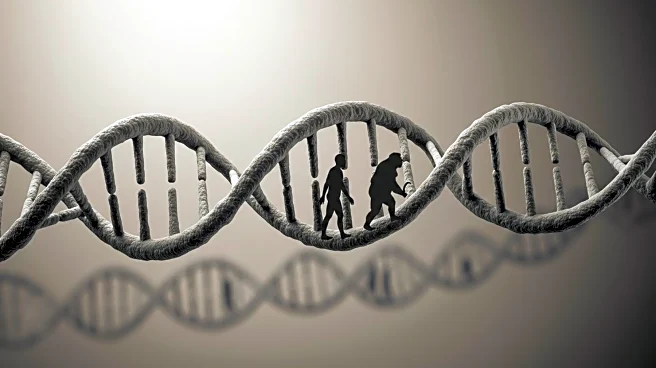What's Happening?
Recent research has identified a protein difference between modern humans and their closest extinct relatives, Neanderthals and Denisovans, which may have contributed to the survival of modern humans. The study, conducted by researchers at the Okinawa Institute of Science and Technology, focused on the enzyme ADSL, which is crucial for DNA synthesis. The modern human version of this enzyme differs by one amino acid from that found in Neanderthals and Denisovans. Experiments on genetically modified mice revealed that those with the human-like variant of ADSL exhibited different behaviors, particularly in learning tasks. This suggests that the mutation may have provided modern humans with an evolutionary advantage in competing for resources.
Why It's Important?
The findings could offer insights into why Neanderthals and Denisovans disappeared while modern humans thrived. Understanding the genetic differences that may have contributed to the survival of modern humans can shed light on human evolution and the development of cognitive abilities. The study highlights the potential impact of genetic mutations on behavior and survival, suggesting that even small genetic changes can have significant evolutionary consequences. This research could pave the way for further studies on the genetic factors influencing human evolution and behavior.
What's Next?
Future research is expected to delve deeper into the mechanisms by which changes in ADSL activity influence behavior. Scientists aim to explore how these genetic differences might interact with other factors to affect behavior and survival. The study's authors anticipate a series of similar investigations that could further illuminate the evolutionary processes that shaped modern humans. Additionally, understanding the balance between the benefits and drawbacks of ADSL activity could inform studies on genetic disorders related to ADSL deficiency.
Beyond the Headlines
The study raises questions about the ethical implications of genetic research and its potential applications. As scientists continue to explore the genetic basis of behavior, considerations around genetic modification and its impact on society may become increasingly relevant. The research also underscores the complexity of behavior and the challenges in translating findings from animal models to humans.









